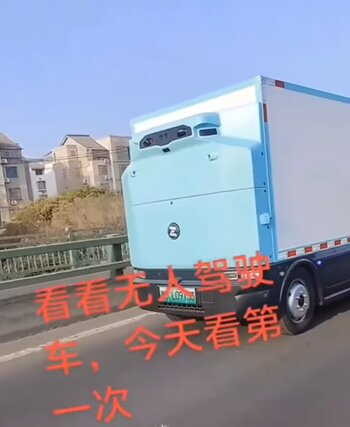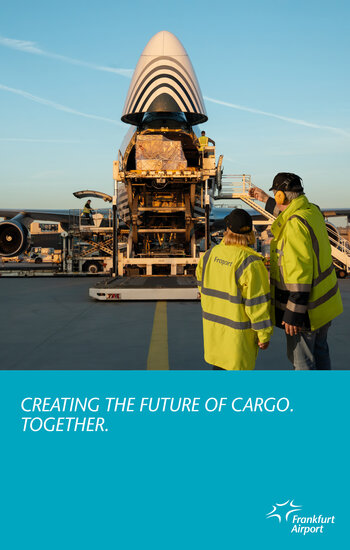Scrolling on LinkedIn this week, it was the post of a video originally attributed to @niccruzpatane/X, of a driverless truck, that made me stop – and feel uneasy, if I’m honest. Why? Because as you can see in the image, the developer and manufacturer, Jiushi (Suzhou) Intelligent Technology Co., Ltd, has done away with the driver’s cab altogether, and what looks more like the backend of a truck, is actually an abrupt, vertical front.

No hands on steering wheels involved, and no human safety back-up sitting in the vehicle… In the not-too-distant future, we could be seeing far more autonomous trucks on our roads. Particularly in China, where this is already on its way to becoming the norm.
A little research uncovered another video with one of these trucks dragging a toppled scooter along by a wheel in an accident the details of which are not known, but illustrative of teething problems robo trucks may still be having. How much safer a human driver distracted by their smartphone, fatigue, or over the alcohol limit may be, could be a point of discussion, here. Fact is: there is an ongoing and growing shortage of drivers in most countries across the world. (In Europe alone, according to The International Road Transport Union, that shortage will stand at around 745 000 truck drivers by 2028 – 17% of the total required workforce.) And fact is that, according to StartUs Insights’ Autonomous Vehicle Market Report 2025, there are currently 1,162 startups and more than 6,140 companies around the world, involved in the autonomous vehicle industry – an industry that is growing in double-figures. The Autonomous Truck segment is today valued at around USD 39.51 billion, and set to increase to USD 65.72 billion in 2030, Mordor Intelligence predicts. It also points out that while North America is the largest market (accounting for one-third of the global autonomous truck market), the fastest-growing one is Asia Pacific.
China going for driverless heavy-duty trucks
China, too, has a truck driver shortage with around 16% of positions remaining unfilled (circa 2.9 million vacancies), and it has taken steps to mitigate that by increasing the upper age limit for large and medium truck license from 60 to 63 years, and letting drivers over 63 continue to work if they pass health assessments. However, it also has a much higher cost issue when it comes to logistics, as Rong Li, the CEO of Suzhou/Jiangsu-based Zhijia Technology (the first Chinese startup to obtain a license to conduct open-road tests for its driverless heavy-duty trucks in China), explained to China Daily, earlier this year: “Compared with developed countries, logistics costs make up a much higher proportion of China’s GDP. Road freight comprises the largest share of China’s logistics industry, and long-haul logistics makes up a trillion-yuan market in China.” China Daily reports that while logistics costs in developed countries account for less than 10% of their GDP, in China, the figure stands at 14.4%.
So, if three self-driving vans can be hired for the same amount as one driver’s salary (according to a BBC report on self-driving Rino.ai e-commerce delivery vehicles already in operation around China), it stands to reason that autonomous trucks are an attractive solution all round.
Reasons for robo trucks
Other reasons for China’s drive towards autonomous trucks are safety and environmental goals (fewer emissions and fewer accidents caused by human error), efficiency and competitiveness (autonomous trucks optimize fuel usage, increase vehicle utilization, and enable 24/7 operation, enhancing supply chain efficiency and reducing freight costs),- and last but not least: the clear “Made in China 2025” push by the government, which seeks to make China more self-sufficient in all technology areas, for example. It has actively promoted autonomous vehicle testing and commercialization of domestic innovation in this field and fosters rapid market growth.
Robo trucks “Made in China”
No wonder, then, that China has more than 40 companies actively developing and deploying autonomous trucks. Major players are Pony.ai (its autonomous freight network already serves core areas such as Beijing-Tianjin-Hebei, the Pearl River Delta, and the Yangtze River Delta), Zhijia Technology (concentrating on heavy-duty autonomous trucks – and first to receive testing license), Inceptio Technology (this time last year, it completed the largest global delivery of self-driving heavy-duty trucks: 400 vehicles were delivered to Chinese company, ZTO Express), Shanghai Automotive Industry Corporation’s UTOPILOT subsidiary (it recently made history, becoming the first in China approved to operate fully unmanned large cargo trucks), Baidu Apollo, and Jiushi Intelligent Technology, for example.
Meanwhile, as of mid-2025, China operates the largest population of autonomous trucks globally, with about 2,090 autonomous heavy-duty trucks in operation (out of an international 3,832) – up from 562 in 2024. The majority are used in mining, port logistics, and industrial settings. Autonomous trucking on highways and urban roads is rapidly expanding with companies conducting cross-provincial expressway tests and logging millions of autonomous kilometers annually.
Booming business
According to Mobility Foresights, the autonomous truck market in China is valued at approximately USD 4.25 billion this year, and is projected to grow to USD 14.73 billion by 2031, with a compound annual growth rate (CAGR) of around 23.1%. (The broader autonomous vehicle market including trucks is even larger, with forecasts reaching USD 170 billion by 2033 in China alone.) The same report predicts that by 2031, autonomous trucks will be widely adopted across the country in long-haul freight corridors, port-to-warehouse routes, and high-volume logistics networks. While continued investment, innovation, clear regulations and public acceptance will influence the pace of deployment, China is set to become a – if not the – global leader in autonomous freight transportation.




